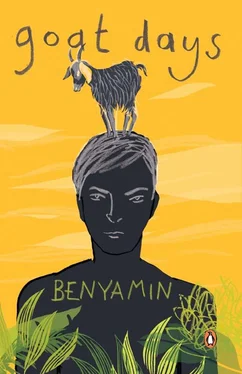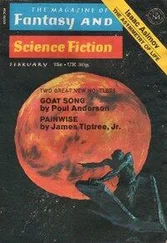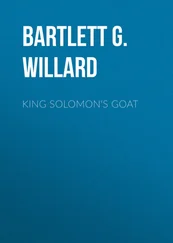Finally that day arrived. I did not have much luggage. Some lemon pickle and some upperi that my pregnant Sainu had fried with love. Some chammanthipodi which Ummah had pounded, disregarding her exhaustion. Pickle of freshwater fish. Two or three sets of clothes (‘Why, ikka, you are going to a land where everything is available in plenty’), a bath towel, two bars of soap, a small tube of toothpaste, a toothbrush, my passport, the ticket and some Indian currency. That was all. But Hakeem had a bagful. I often thought that the bag contained enough for a family to eat for a century. Sasi and I often poked fun at him about it, but we teased him merely to see his discomfort.
Sasi and another man from the room came with us to the airport. Like all Gulf Malayalis who leave the homeland, we also promised our friends we would arrange visas for them as soon as we landed there and met our Arab. They laughed as if they had heard it many times. Still, a sprig of hope probably sprouted in their hearts. Isn’t it on some such hope that the Bombay Malayali pushes his miserable life along?
As a reward for looking after us for a week, I removed my watch — Sainu’s brother had given it to me when he returned from the Gulf for the first time — and gave it to Sasi. Then, from a phone booth at the airport, I tried to call home. There was a phone in a Moplah house in the neighbourhood. When the connection finally went through, I told them to give my message to my family.
Everything went off well at that airport. It was only at immigration that some questions were asked. As I did not speak Hindi and the officer did not speak Malayalam and as a hundred-rupee note was handed over inside the passport, that hurdle was dealt with quickly. It was an Air India flight. Bombay to Riyadh. A four and a half hour journey. So, at 4.30 p.m. local time on 4 April 1992, I landed in Riyadh.
City of my dreams, I have arrived. Kindly receive me. Ahlan wa sahlan!
Hakeem and I alighted from the plane into a wonderland larger than what we had dreamt of. At that time, the Arab world was not shown on TV or cinema as much as it is today. I could only imagine that world from the words of those who had been there. Because of that, every new spectacle proclaiming the fullness of their affluence amazed me.
For me, Bombay was worry, Riyadh, wonder.
I could not remain starry eyed in that wonderland for long. We waited outside the airport after finishing the immigration formalities and, as no one came to collect us, we became anxious. All those who had come along with us in the flight had left in the vehicles of their friends, sponsors and companies. There was no one to pick us up.
The agency in Bombay had told us that the sponsor would be there at the airport. The plane had landed an hour late. Had he come searching for us and returned without finding us? Or was he wandering around the airport looking for us? How would he recognize us out of these hundreds of thousands of people? How different I look from my photo in the passport! We could not hope to be recognized with its help. Or had he forgotten that we were coming? Had the agency forgotten to intimate him? A heap of questions accumulated in front of me. As the time of waiting increased, the heap swelled in volume.
Hundreds of Arabs walked back and forth. Men and women. I distracted myself by picturing ourselves in Antarctica instead and imagining those who crossed us as black and white penguins. I would pleadingly look at the faces (into the eyes of the female penguins whose faces were not visible) of each penguin. I am the Najeeb you are looking for. This small boy with me is the Hakeem you are searching for. I communicated to everyone with my eyes and with my suppliant posture. But no one heeded my appeal. Everyone walked away and faded into their busy lives.
Our wait continued. Meanwhile, many planes landed and people of many nations speaking many languages kept pouring in. They too dispersed and disappeared in many vehicles. As the azan for the maghreb sounded, we learned that it was already evening. When we could not find anyone even after the prayer, we walked to a Malayali-looking airport official and told him about our plight. He asked me the name of the company I had come to work for. I had no answer. He asked for the sponsor’s number. I had forgotten to get that from the agent. He asked for the phone number of any local person I knew. I didn’t know anyone. I had the address of the company of the Karuvatta brother-in-law and I showed him that. It was a place far away from Riyadh. He would not be able to help. ‘Anyway, wait. Surely your arbab will not fail to turn up,’ he said and walked back to his work. So it was from that stranger that I heard for the first time that Arabic word ‘arbab’!
Arbab! Arbab! I repeated it in my mind. So amusing. A harmonious sound. Who is that arbab? What is this arbab? Whatever it is, the arbab has to come, only then can we go. Arbab, come fast, how long we have been waiting. Come fast, save us from this fear. Arbab! Arbab!
Another hour and a half must have passed. As I had given my only watch to Sasi in Bombay, I did not know the exact time. I didn’t feel like wandering through the airport looking for a clock to find out the time of the day. What was the use of that? What if the arbab came and left in the meantime?
Outside the airport, the city had begun to travel into night. Our panic began to consume us. Then, an old vehicle — not a car, jeep or lorry (it was after a long time that I learned that it was called a pick-up) — rumbled in and stopped at the main entrance of the airport, even though it was a no-parking area, and an Arab jumped out of it. As soon as I saw him, I don’t know why, my mind whispered that he was the arbab I had been waiting for. Impatiently, he walked to and fro in the airport for a while. Although our eyes were following him incessantly, he did not see us. He paced restlessly. I didn’t have the courage to go up to him and enquire whether he was my arbab. That thought might never have occurred to Hakeem. Anyway, in which language would I ask him? After going around the airport for four or five times, he found us. We moved towards him.
‘Abdullah?’ He pointed his finger at me. I had never heard such a crude voice before. I shook my head. ‘Abdullah?’ He pointed his finger at Hakeem who also shook his head indicating a no. Then he asked something in Arabic. There was anger in his tone. Luckily, I didn’t understand anything, Hakeem, even less.
Leaving us there, he went around the airport again. From time to time he would grab the passport of anyone who stood alone and look at it. Finally, he came back to us. Then he snatched my passport and looked into it. Similarly, he snatched Hakeem’s passport. Then, without saying anything, he walked forward. Carrying our bags, we followed him.
I had associated Arabs with the fragrance of athar and other perfumes. Hundreds of Arabs had walked past us wafting enticing fragrances. I had joked to Hakeem some time earlier that a new perfume could be made by distilling the urine of the Arabs who use perfume every day. But my arbab had a severe stench, some unfamiliar stink. Likewise, while the other Arabs wore well-ironed, pristine white clothes, my arbab’s dress was appallingly dirty and smelly.
Whatever it is, an arbab had come for me. I was relieved by that thought. I too have become a Gulf NRI. I too have an arbab of my own. The one who walks in front of me is the custodian of all my dreams, the visible god who would fulfil all my ambitions. My arbab! Arbab — at that moment I could not have liked any other word more!
The arbab’s vehicle was the oldest that I had ever seen. Its doors and bonnet were loose, rusty and badly in need of a coat of paint. As their locks did not work, the doors were fastened with rope. Springs peeped out from the seat cushions.
Читать дальше




![Джон Харгрейв - Mind Hacking [How to Change Your Mind for Good in 21 Days]](/books/404192/dzhon-hargrejv-mind-hacking-how-to-change-your-min-thumb.webp)







